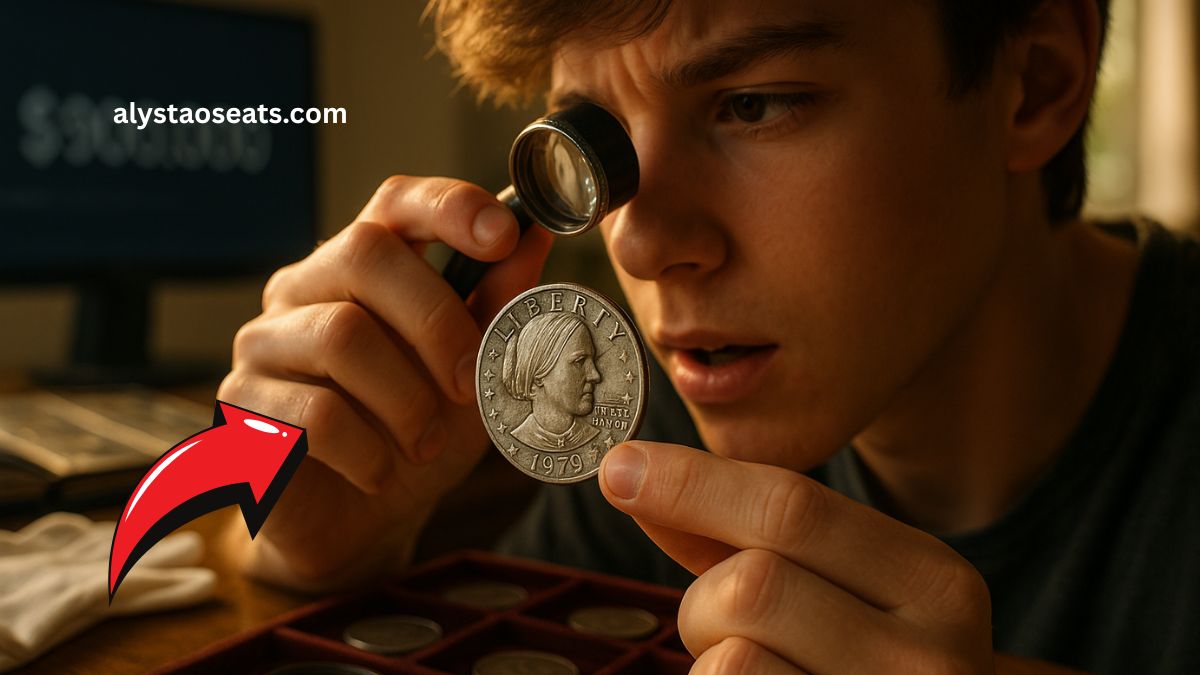In a jaw-dropping recent discovery, a 16-year-old from Ohio unearthed a 1979 Susan B. Anthony dollar exhibiting a die‑clash mint error, now appraised at an astonishing $900,000.
This breathtaking find has reignited interest in error coins and reminds collectors: sometimes, fortune lies in your pocket change.
What Is a Die‑Clash Error?
A die‑clash occurs when coin minting dies strike each other without a planchet (coin blank) in between, transferring raised designs from one die to the other.
When a coin is subsequently struck, it carries ghostly, mirror‑image impressions of the opposite side. The teen’s coin shows dramatic die‑clash artifacts on both the obverse (Susan B. face) and reverse, making it exceptionally rare.
Key Details at a Glance
| Feature | Details |
|---|---|
| Finder | 16‑year‑old teen from Ohio |
| Coin Type | 1979 Susan B. Anthony dollar |
| Error Type | Die‑clash on both obverse and reverse dies |
| Estimated Value | $900,000 |
| Mint Mark | Unspecified (likely Philadelphia “P”) |
| Eye Appeal | Strong clash visibility, ideal for certification |
| Market Reaction | Became viral in numismatic circles; sparked excitement online |
Why This Discovery Is So Significant
- Rarity & Condition: Die‑clash errors are uncommon, especially severe ones that affect both coin sides. The coin’s sharp clash impressions make it a standout showcase piece.
- Historical Appeal: The Susan B. Anthony dollar was groundbreaking—it was the first U.S. coin to depict an actual woman on circulation currency (1979–1981, with a brief revival in 1999).
- Numismatic Value: While most SBA dollars trade near face value, rare errors like this can command hundreds of thousands, even up to millions, depending on their significance and market interest .
Auction Buzz & Collector Frenzy
Although this specific die‑clash coin hasn’t yet appeared at public auction, experts believe demand will be intense. Online forums and numismatic groups have buzzed with speculation:
A die clash… pretty cool. I don’t know if it is valuable enough to submit for grading though. Definitely worth more than a dollar at least.
Collectors advise professional grading and certification (e.g., PCGS, NGC) to confirm authenticity and rarity. Once graded, it could fetch a seven-figure price, rivaling other world-record error coin sales.
How to Spot Your Own Treasure
If you have SBA dollars or jars of old coins, here’s what to look for:
- Ghost images of designs bleeding through into the opposite side
- Uneven, stretched features on Susan B’s portrait or the eagle
- Abnormal textures or doubled elements
Any SBA dollar showing suspicious anomalies should be examined by a professional grader—the next high-value error might be hiding in plain sight.
What began as a typical day for a 16-year-old in Ohio has turned into a numismatic sensation, unveiling a $900,000 Susan B. Anthony dollar with a dramatic die‑clash error.
This find underscores the allure and unpredictability of rare coin collecting—where an ordinary coin can transform into a treasure of historical and financial magnitude. If you still have SBA dollars around, take a closer look—you might be the next to strike gold.
FAQs
What makes a die‑clash error so valuable?
The misalignment transfers complex design elements between dies, creating rare, visible “ghost” images that are highly sought by collectors.
How much can such an error coin fetch at auction?
Depending on condition and certification, die‑clash SBA dollars have potential to sell for hundreds of thousands, even $900K or more.
How can I verify my coin is authentic?
Have it graded by a reputable service (PCGS, NGC) which authenticates the coin, evaluates the error grade, and enhances auction visibility.
